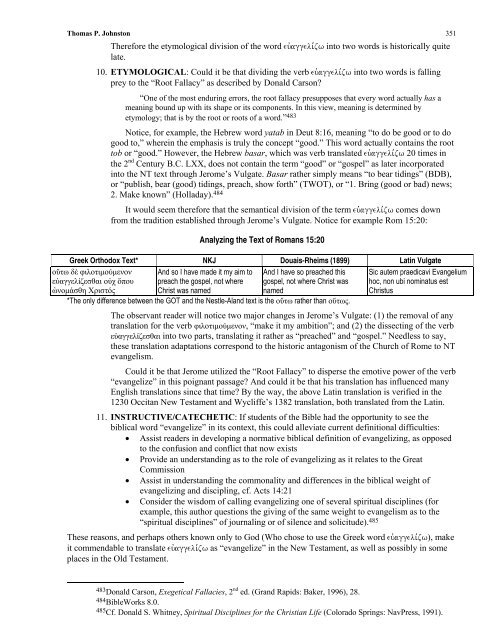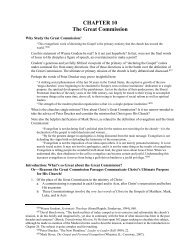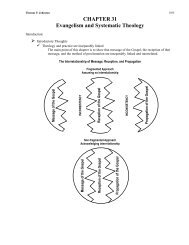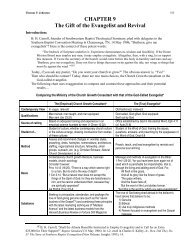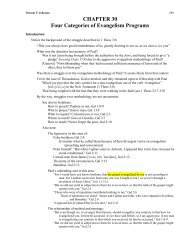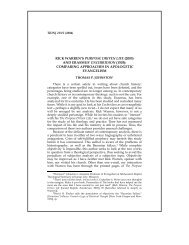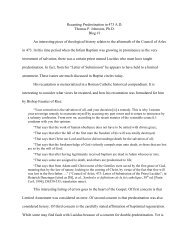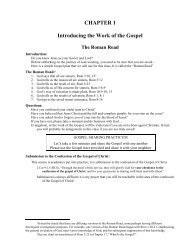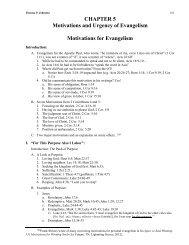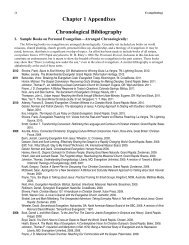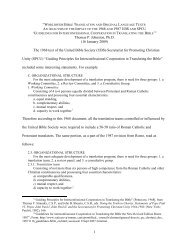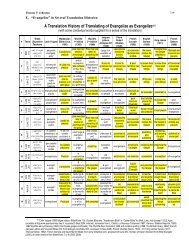CHAPTER 7 Defining Evangelizing - Evangelism Unlimited
CHAPTER 7 Defining Evangelizing - Evangelism Unlimited
CHAPTER 7 Defining Evangelizing - Evangelism Unlimited
You also want an ePaper? Increase the reach of your titles
YUMPU automatically turns print PDFs into web optimized ePapers that Google loves.
Thomas P. Johnston 351<br />
Therefore the etymological division of the word euvaggeli,zw into two words is historically quite<br />
late.<br />
10. ETYMOLOGICAL: Could it be that dividing the verb euvaggeli,zw into two words is falling<br />
prey to the “Root Fallacy” as described by Donald Carson?<br />
“One of the most enduring errors, the root fallacy presupposes that every word actually has a<br />
meaning bound up with its shape or its components. In this view, meaning is determined by<br />
etymology; that is by the root or roots of a word.” 483<br />
Notice, for example, the Hebrew word yatab in Deut 8:16, meaning “to do be good or to do<br />
good to,” wherein the emphasis is truly the concept “good.” This word actually contains the root<br />
tob or “good.” However, the Hebrew basar, which was verb translated euvaggeli,zw 20 times in<br />
the 2 nd Century B.C. LXX, does not contain the term “good” or “gospel” as later incorporated<br />
into the NT text through Jerome’s Vulgate. Basar rather simply means “to bear tidings” (BDB),<br />
or “publish, bear (good) tidings, preach, show forth” (TWOT), or “1. Bring (good or bad) news;<br />
2. Make known” (Holladay). 484<br />
It would seem therefore that the semantical division of the term euvaggeli,zw comes down<br />
from the tradition established through Jerome’s Vulgate. Notice for example Rom 15:20:<br />
Analyzing the Text of Romans 15:20<br />
Greek Orthodox Text* NKJ Douais-Rheims (1899) Latin Vulgate<br />
οὕτω δὲ φιλοτιμούμενον<br />
εὐαγγελίζεσθαι οὐχ ὅπου<br />
ὠνομάσθη Χριστός<br />
And so I have made it my aim to<br />
preach the gospel, not where<br />
Christ was named<br />
And I have so preached this<br />
gospel, not where Christ was<br />
named<br />
*The only difference between the GOT and the Nestle-Aland text is the οὕτω rather than οὕτως.<br />
Sic autem praedicavi Evangelium<br />
hoc, non ubi nominatus est<br />
Christus<br />
The observant reader will notice two major changes in Jerome’s Vulgate: (1) the removal of any<br />
translation for the verb φιλοτιμούμενον, “make it my ambition”; and (2) the dissecting of the verb<br />
εὐαγγελίζεσθαι into two parts, translating it rather as “preached” and “gospel.” Needless to say,<br />
these translation adaptations correspond to the historic antagonism of the Church of Rome to NT<br />
evangelism.<br />
Could it be that Jerome utilized the “Root Fallacy” to disperse the emotive power of the verb<br />
“evangelize” in this poignant passage? And could it be that his translation has influenced many<br />
English translations since that time? By the way, the above Latin translation is verified in the<br />
1230 Occitan New Testament and Wycliffe’s 1382 translation, both translated from the Latin.<br />
11. INSTRUCTIVE/CATECHETIC: If students of the Bible had the opportunity to see the<br />
biblical word “evangelize” in its context, this could alleviate current definitional difficulties:<br />
Assist readers in developing a normative biblical definition of evangelizing, as opposed<br />
to the confusion and conflict that now exists<br />
Provide an understanding as to the role of evangelizing as it relates to the Great<br />
Commission<br />
Assist in understanding the commonality and differences in the biblical weight of<br />
evangelizing and discipling, cf. Acts 14:21<br />
Consider the wisdom of calling evangelizing one of several spiritual disciplines (for<br />
example, this author questions the giving of the same weight to evangelism as to the<br />
“spiritual disciplines” of journaling or of silence and solicitude). 485<br />
These reasons, and perhaps others known only to God (Who chose to use the Greek word euvaggeli,zw), make<br />
it commendable to translate euvaggeli,zw as “evangelize” in the New Testament, as well as possibly in some<br />
places in the Old Testament.<br />
483 nd<br />
Donald Carson, Exegetical Fallacies, 2 ed. (Grand Rapids: Baker, 1996), 28.<br />
484BibleWorks 8.0.<br />
485Cf. Donald S. Whitney, Spiritual Disciplines for the Christian Life (Colorado Springs: NavPress, 1991).


